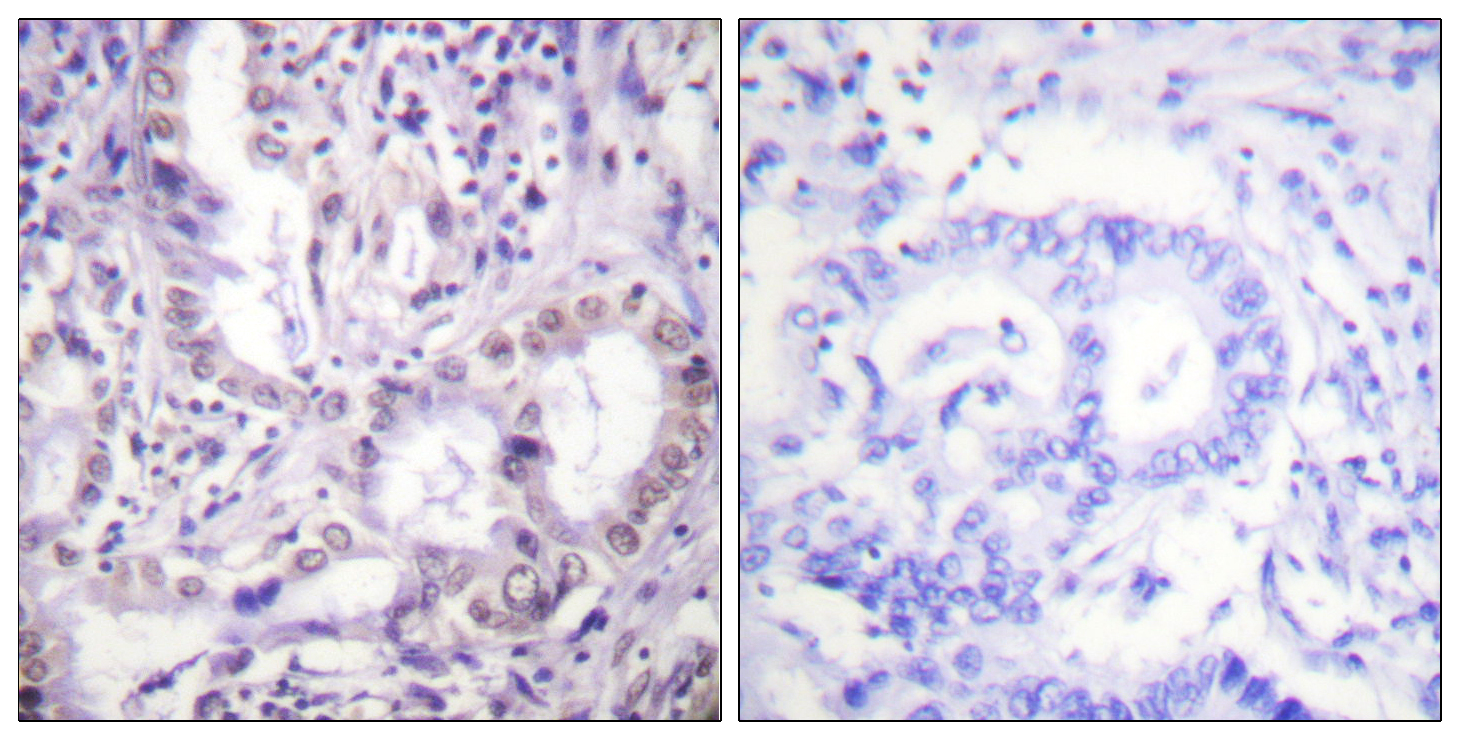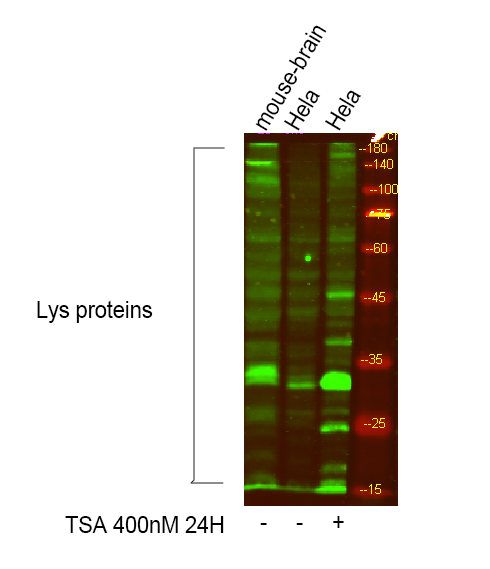Acetyl Lys proteins Polyclonal Antibody
- Catalog No.:YK0020
- Applications:WB;IHC;IF;ELISA
- Reactivity:Human;Mouse;Rat;Monkey;plant
- Target:
- Acetyl Lys proteins
- Immunogen:
- Synthesized acetyl-peptide derived from human acetylation Lys proteins.
- Specificity:
- Acetyl-Lys proteins Polyclonal Antibody detects endogenous levels of acetylated Lys proteins.
- Formulation:
- Liquid in PBS containing 50% glycerol, 0.5% BSA and 0.02% sodium azide.
- Source:
- Polyclonal, Rabbit,IgG
- Dilution:
- WB 1:500 - 1:2000. IHC 1:100 - 1:300. IF 1:200 - 1:1000. ELISA: 1:10000. Not yet tested in other applications.
- Purification:
- The antibody was affinity-purified from rabbit antiserum by affinity-chromatography using epitope-specific immunogen.
- Concentration:
- 1 mg/ml
- Storage Stability:
- -15°C to -25°C/1 year(Do not lower than -25°C)
- Observed Band(KD):
- 20,40,80,175kD
- Background:
- Acetylation of lysine, like phosphorylation of serine, threonine or tyrosine, is an important reversible modification controlling protein activity. The conserved amino-terminal domains of the four core histones (H2A, H2B, H3, and H4) contain lysines that are acetylated by histone acetyltransferases (HATs) and deacetylated by histone deacetylases (HDACs). Signaling resulting in acetylation/deacetylation of histones, transcription factors, and other proteins affects a diverse array of cellular processes including chromatin structure and gene activity, cell growth, differentiation, and apoptosis. Recent proteomic surveys suggest that acetylation of lysine residues may be a widespread and important form of posttranslational protein modification that affects thousands of proteins involved in control of cell cycle and metabolism, longevity, actin polymerization, and nuclear transport. The regulation of protein acetylation status is impaired in cancer and polyglutamine diseases, and HDACs have become promising targets for anti-cancer drugs currently in development.
CsHLS1-CsSCL28 module regulates compact plant architecture in cucumber PLANT BIOTECHNOLOGY JOURNAL Chunhua Wang WB Nicotiana benthamiana 1:1000 leaf
- June 19-2018
- WESTERN IMMUNOBLOTTING PROTOCOL
- June 19-2018
- IMMUNOHISTOCHEMISTRY-PARAFFIN PROTOCOL
- June 19-2018
- IMMUNOFLUORESCENCE PROTOCOL
- September 08-2020
- FLOW-CYTOMEYRT-PROTOCOL
- May 20-2022
- Cell-Based ELISA│解您多样本WB检测之困扰
- July 13-2018
- CELL-BASED-ELISA-PROTOCOL-FOR-ACETYL-PROTEIN
- July 13-2018
- CELL-BASED-ELISA-PROTOCOL-FOR-PHOSPHO-PROTEIN
- July 13-2018
- Antibody-FAQs
- Products Images

- Immunofluorescence analysis of HeLa cells, using Lys-Acetylated Proteins Antibody. The picture on the right is blocked with the synthesized peptide.

- Immunohistochemistry analysis of paraffin-embedded human lung carcinoma, using Lys-Acetylated Proteins Antibody. The picture on the right is blocked with the synthesized peptide.

- Western blot analysis of lysates from COS7 cells treated with TSA 400uM 24h, using Lys-Acetylated Proteins Antibody. The lane on the right is blocked with the synthesized peptide.

- Western blot analysis of lysates from 1) Hela,2)mouse brain, (Green) primary antibody was diluted at 1:1000, 4°over night, secondary antibody(cat:RS23920)was diluted at 1:10000, 37° 1hour.



